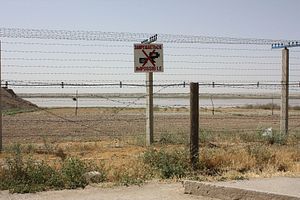Uzbekistan–set to host the upcoming Shanghai Cooperation Organization (SCO) summit–is closing its borders. The move mirrors previous border closings associated with major events or holidays, deemed a security measure by Tashkent.
The SCO summit, scheduled for June 23-24, is expected to bring together the heads of state of Russia, China, Kazakhstan, Kyrgyzstan, Tajikistan, and Uzbekistan, as well as those of India and Pakistan, which are expected to accede as full members this year. Beyond the issue of Pakistani and Indian membership, the organization is expected to highlight what the Russian Foreign Ministry’s Ambassador-at-Large Bakhtier Khakimov called its “jubilee summit,” marking the organization’s 15th year in its present form. Founded in 1996 as the Shanghai Five, Uzbekistan became the only additional country to-date to join the group in 2001, when the group rebranded as the SCO. The SCO covers political, economic and military cooperation and is just one of the alphabet-soup of intersecting and overlapping regional organizations.
The SCO summit, which Uzbekistan last hosted in 2010, has motivated a number of what EurasiaNet called “over-the-top preparations”: early holidays for college students in Tashkent, the take-down of satellite dishes in the capital, and the banning of Ramadan iftars at mosques and restaurants, ostensibly to keep large numbers of people from congregating.
According to the Moscow Times, the Uzbek border service said Wednesday that people, vehicles, and goods from the country’s four neighboring nations–Kazakhstan, Kyrgyzstan, Tajikistan, and Turkmenistan–would be unable to gain entry from June 15 to June 25. The border with Afghanistan was not mentioned in the suspension notice, though as the Moscow Times noted it remains under heavy guard: “The area is considered to be one of the most heavily fortified borders in the world, and is flanked by two barbed wire fences, one of which is electrified, and land mines.”
KyrTAG reported an exception as well: residents of the Kyrgyz village of Barak, a dwindling Kyrgyz exclave in Uzbekistan. The village is separated from the rest of Kyrgyzstan by a four kilometer road controlled (and reportedly often closed) by Uzbekistan. In 2011, it was estimated that about 700 people remained in the village, though over the years numerous families have relocated to greater Kyrgyzstan.
In March, Kyrgyz President Almazbek Atambayev threatened to skip the SCO summit over a border kerfuffle–it’s unclear whether that threat still stands. The tensions were touched off at the time by a sudden increase in Uzbek military forces near a disputed segment of the Kyrgyz-Uzbek border along the northern edge of the Fergana valley. The Uzbek national security service claimed the closure of part of the border in March was part of increased security measures during Nowruz.

































